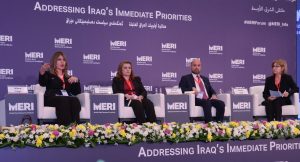Women Empowerment in Institutional Leadership
This policy debate focused on an important issue, namely the relatively weak participation of women in decision-making in Iraq and Kurdistan Region. The four speakers stressed that this disparity represents a major challenge to achieving the goals of sustainable development, equality, prosperity, peace and stability.
- Muna Yaqo, The Kurdistan Human Rights Board
- Payman Ramazan, President of Raparin University
- Ashraf Al-Dahan, Director General of the Non-Governmental Organisations, Baghdad
- Suzan Aref, Women Empowerment (Speaker/Moderator)
The panelists pointed out that there are many plans, strategies and policies that work to enhance women’s status and participation in Iraq and the Kurdistan Region, and they highlighted some of the challenges facing women’s participation in leadership roles.
Women’s Participation in Decision-Making
Mr. Ashraf Al-Dahan, Director General of the Office of Non-Governmental Organizations – Iraq, believes that the central government pays great attention to the issue of women’s empowerment. It established the Women’s Empowerment Department in the General Secretariat of the Council of Ministers, with branches in all ministries and governorates. This department works in cooperation with civil society organizations concerned with the issue of women, especially in areas affected by terrorism. He also pointed out that the government has developed policies and plans that support women’s participation in society, including the National Strategy for Iraqi Women 2030, in cooperation with the United Nations. Al-Dahan believes that statistics indicate that there are 298 effective organizations concerned with women’s affairs in Iraq, 73 of which are headed by women. He stressed that these organizations play a prominent role in empowering Iraqi women and bringing about change in the reality of women in Iraqi society.

However, the Iraqi government faces some challenges in the field of women’s empowerment, including that some segments of society think differently and believe that women have a specific role. Also, there is an attack against the issue of social diversity, aimed at inhibiting the issue of women’s empowerment, in addition to the lack of funding for organizations concerned with women’s empowerment.
Empowering women in the Kurdistan Region: a comprehensive perspective
The issue of women’s empowerment is not limited to the number of women in positions of power, but rather relates to the essence of gender equality within society. Mona Yaqo, Head of the Kurdistan Human Rights Commission, called for focusing on human rights as a comprehensive framework, instead of talking about the rights of women and men separately, stressing that society will not enjoy prosperity unless all its members are empowered, regardless of gender. Yaqo also described the difficulties faced by women in society, and pointed to the sense of fear that some women experience when assuming leadership positions. In addition, she provided a critical assessment of the quota system for women in political office. She stressed the need to work hard to change the intellectual structure of society, stressing that achieving gender equality will only be achieved by addressing the roots of the problem represented by customs and traditions as well as the lack of political support for their participation.
Yaqo criticized the quota system, calling for a focus on efficiency and not just numbers or party affiliation in women holding office. She also criticized the models presented by political parties, stressing that the accession of independent women to positions represents a real movement towards a feminist renaissance. She urged young men and women to focus on thought and visions to confront the stereotypical image promoted by the media of women, and to work to prove their worth and competence.
The speaker concluded her speech with practical suggestions that would enhance women’s empowerment, including focusing on human rights as a comprehensive perspective, empowering women through education and training, and supporting their effective participation in all fields, including decision-making.

Leadership styles and women’s representation
The speakers discussed the difference in leadership styles depending on the field, and emphasized the family role and individual choice in the path of specializations and experiences at the university level. Peyman Ramazan, President of Raparin University, pointed out the high percentage of females at Raparin University, and analyzed the factors that affect female representation in universities, taking Raparin University as an example.
Ramazan also noted that in countries suffering from wars or post-conflict periods, girls are often not sent to school or their studies are delayed, and priority is given to male education. With regard to education, the President of Raparin University indicated that the university is a unique case, as despite being located in a district that is administratively a province, it has succeeded in achieving a noticeable balance between genders in the number of its students. Last academic year, the university accepted 5,500 students, of whom 3,888 were female. This year, 1,313 new students joined the university, of whom 854 were female.
Several factors appear to contribute to the high percentage of females at Raparin University. One possible reason is the location of the university, which may influence student demographics in terms of gender. Many families do not hesitate to send their male children to private universities far from their areas of residence, unlike girls who are usually sent to universities close to their families. This trend highlights prevailing societal norms that often restrict the movement of girls compared to boys. There is also a potential impact of immigration on increasing the number of female students at Raparin University.

The reasons for the observed gender gap in leadership positions are multiple. Factors such as political party support, which is essential for career advancement, and family support, which plays a vital role in individuals’ career development, contribute to the current situation. Ultimately, the ability to lead effectively depends on individual skills and abilities, which can vary regardless of gender.
In conclusion, the importance of constructive and multifaceted dialogue on the issue of empowering women in leadership positions cannot be denied. By encouraging open dialogue, initiatives aimed at enhancing competencies and capabilities, and supporting policies that ensure balanced roles, we can move towards a bright future that guarantees the effective participation of women in all aspects of public life, including leadership positions, and achieve sustainable development, prosperity, peace and stability for all.
MERI Forum 2023
Addressing Iraq’s Immediate Priorities
10 & 11 October, 2023
Session 3: Women Empowerment in Institutional Leadership
Session Video

